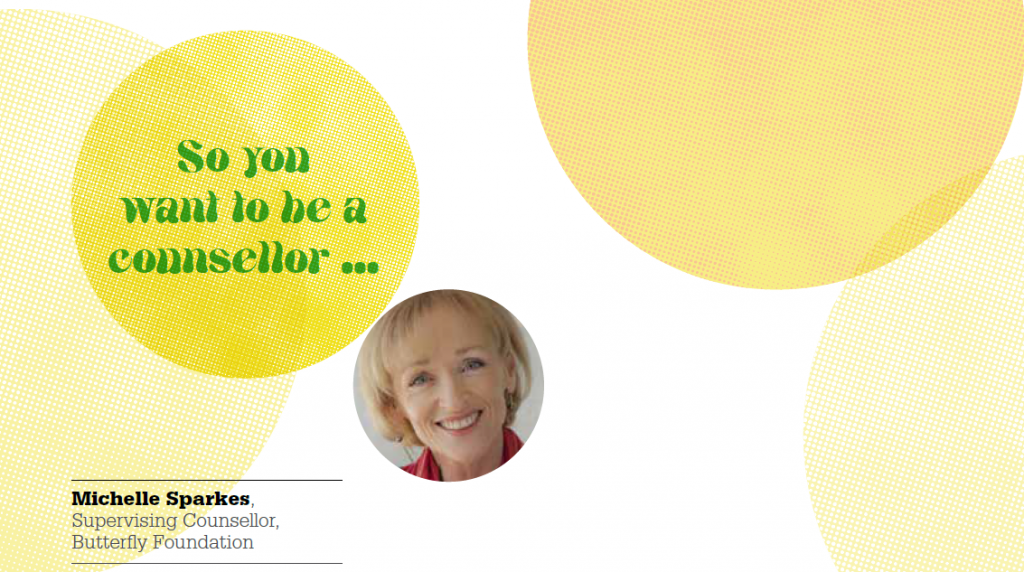Professional Advice: So you want to be a Counsellor…. Part 3
So You Want To Be A Counsellor is a multi-part advice series where counsellors share with ACA their professional journeys and the things they have learnt along the way. As featured in the Counselling Australia Journal Spring 2022, Volume 23 Number 3.
Michelle Sparkes, Supervising Counsellor at the Butterfly Foundation, shares her professional journey and tips for new professionals.

Tell us about your work.
I work with individuals, 16 years and older (and their families, carers and partners, as appropriate), to help them recover from the grip of disordered eating and body image concerns. Ultimately, these issues reflect a way of coping with challenging self and life experiences. I love this work and have been helping individuals recover from disordered eating for over 25 years. I take a holistic, whole-person approach to these challenging health and life-consuming problems, drawing on my professional experience as a physical and mental health clinician, and my lived experience of anorexia, eating disorder not otherwise specified (EDNOS) (now called OSFED – other specified feeding and eating disorders) and binge eating in my teen and early adult years. I also work as a supervising counsellor for the Butterfly National Helpline (Australia’s national charity for eating disorders), providing oversight, training and supervision to helpline counsellors and working directly with consumers to provide information, support, guidance and referrals.
Do you love your work? Why?
My work at Butterfly gives me the opportunity to provide in the moment support to consumers and to invest in the training, upskilling and supervising of new/ er counsellors. My private work gives me the opportunity to work with individuals in a deeper, more substantial way and to witness their transformation over time. It is a pleasure and a privilege to do this work.
Looking back to your final year as a student (before you started your counselling career), what are the top three pieces of advice you give?
1. There are no stupid questions. Glean as much as you can from the practitioners you are learning from – your questions and their answers will help everyone.
2. Value the relationships and the different perspectives and life experience of your teachers and colleagues. You are members of the counselling body, and we are all richer for our diversity of insight, understanding and experience.
3. Volunteer for role-plays – these are rich opportunities for learning. Hearing and feeling yourself respond to a counsellor’s presence, tone, attitude and questions are incredibly valuable and you may never have a better opportunity to do this.
Imagine yourself entering your first counselling session as a qualified counsellor. What is the knowledge or advice you wish you had had?
Relax, you don’t need to know everything. Put your training and expectations to one side and focus on the person in front of you. Your capacity to connect with this person, to understand their needs and concerns and their hopes and desires is the most important thing for you to focus on right now. Be present, be warm, be relaxed, listen, listen, listen, never assume, observe, reflect, respond and let this process gently unfold and guide you.
Would you change your decision to be a counsellor or psychotherapist? Why?
I love being a counsellor in the eating disorder space – it’s a bit of an umbrella term, but it allows me the opportunity to provide the support that is right for the person I’m working with. A frustration for me is that, despite being registered as a counsellor since 2006 and amassing a huge amount of clinical experience and further training, I can’t offer my clients the benefit of a Medicare rebate under the Eating Disorder Plan, while a psychologist with the eating disorder credential can. Nor can I (based on my current ACA level) offer my clients much in the way of health fund rebates. It’s a frustration for me and a disadvantage for my clients. I am a credentialed eating disorder clinician, I‘ve worked in the eating disorder recovery space for over 25 years, I’ve authored books and developed eating disorder recovery programs and training, I’ve supervised counsellors on the Butterfly Helpline for the past three years and I’ve helped hundreds of people recover from disordered eating in private practice. This Medicare rebate regulation doesn’t feel like a match or true reflection of my accumulated training, knowledge, skills and experience.
What is your definition of counselling?
I like this definition: Professional counselling is a safe and confidential collaboration between qualified counsellors and clients to promote mental health and wellbeing, enhance self-understanding and resolve identified concerns. Clients are active participants in the counselling process at every stage. ■



